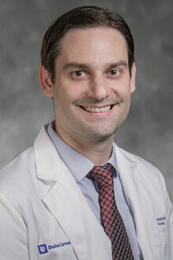As a member of the National Comprehensive Cancer Network (NCCN)—an alliance of the world’s leading cancer centers — we are at the forefront of outcomes research. Our multidisciplinary group is investigating lung cancer through basic, translational, and clinical research. A wide variety of clinical and research projects are led by our thoracic surgical oncologists, medical oncologists, and radiation oncologists, as well as basic scientists, population scientists, pulmonologists, and radiologists.

Thoracic Cancer
Duke Cancer Institute’s thoracic cancer disease group is recognized for its innovative, aggressive, and personalized approach to detecting and treating lung cancer, the leading cause of death from cancer in the U.S. Our lung cancer program guides treatment decisions for the newly diagnosed or those seeking a second opinion.
- About
- Team
- Treatment
- Research
- Clinical Trials
- Events
- News
- None
Contacts
Nolan Miller
Administrative Director
 nolan.miller@duke.edu
nolan.miller@duke.edu
 919-684-1671
919-684-1671
Debra Shoemaker
Assistant Research Practice Manager
 debra.shoemaker@duke.edu
debra.shoemaker@duke.edu
 919-681-4768
919-681-4768
Leadership

Co-Lead, Thoracic Oncology Program

Associate Director, Clinical Research

Co-Lead, Thoracic Oncology Program
Medical Oncology

Assistant Professor of Medicine

Associate Professor of Medicine
Yeshu Conn
Nurse Practitioner

Tara Herrmann
Physician Assistant

Medical Assistant Professor in the Department of Medicine

Assistant Professor of Medicine

Professor of Medicine

Assistant Professor of Medicine

Associate Professor of Medicine

Professor of Medicine

Jennifer Tenhover
Nurse Practitioner
Surgical Oncology

S. Balderson
Physician Assistant

Assistant Professor of Surgery

Hunter Clark
Nurse Practitioner

Hilary Crittenden
Nurse Practitioner

Robert Ferguson
Nurse Practitioner

George Barth Geller Distinguished Professor for Research in Cancer

Jenny Hinderer
Physician Assistant

Kasey Johnson
Nurse Practitioner

Associate Professor of Surgery

Erin Kunz
Physician Assistant

Roshni Mapp
Physician Assistant
Michelle Metzler
Physician Assistant

Associate Professor of Surgery
Radiation Oncology

Assistant Professor of Radiation Oncology

Professor of Radiation Oncology

Assistant Professor of Radiation Oncology
Diagnostic Radiology

Associate Professor of Radiology
Interventional Pulmonology

Assistant Professor of Medicine

Associate Professor of Medicine
Lung Cancer Screening

Hilary Crittenden
Nurse Practitioner

Nurse Practitioner

Associate Professor of Radiology

Associate Professor of Surgery

Jennifer Wilkins
Nurse Practitioner
Our thoracic oncology surgeons are national leaders in minimally invasive surgical procedures. We perform more than 1,600 minimally invasive surgeries every year on all types and stages of lung cancer. As a result, patients experience less post-operative pain and recover faster.
Our radiation oncologists have access to specialized techniques, such as stereotactic body radiation therapy (SBRT) for early-stage lung cancer and radiation treatment planning aided by four-dimensional computed tomography (4D CT).
Our board-certified lung imaging specialists undergo advanced training in the early detection of lung cancer.
An important research strategy is the study of how individual genes affect oncogenesis and tumor progress. In the laboratory, some investigators are studying mouse models to determine the role of stem cells in the development of cancer in humans and in the development of resistance to treatment.
Clinically, researchers hope to discover how to use unique genetic mutations to personalize treatment and are looking at subgroups of patients to see how they respond to treatment.
Several studies are also ongoing utilizing a large tissue bank and database of patients treated for lung cancer at Duke University since 1995.
Lung cancer clinical research at Duke has focused on biomarker discovery and development —the use of molecular signatures to improve the assessment of prognosis and the development of specific new therapies.
The formation of the program has allowed for the optimal collaboration of the best basic science underway on the Duke campus with ongoing clinical and translational lung cancer research programs.
Our medical oncologists have developed several drugs that have received FDA approval. These drugs help improve patient outcomes.


